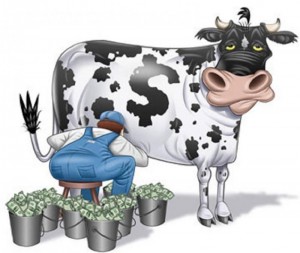 It’s hard to beat experience, strength and knowledge, right? Try telling that to the Los Angeles Lakers.
It’s hard to beat experience, strength and knowledge, right? Try telling that to the Los Angeles Lakers.
Conventional wisdom said the Lakers were primed to win their third consecutive NBA title this year. They had a tall, dominating front line with Gasol, Bynum and Odom. Their coach had won more championships than any other NBA coach. They had the most battle-tested team in the playoffs. And of course they had Kobe Bryant, rated by many as the game’s best closer.
But as so often happens in sports, conventional wisdom got taken to the woodshed. The Lakers got swept in four games by the Dallas Mavericks. And they looked old, slow and disinterested in the process.
One reason I enjoy watching sports is that it affords the opportunity to see conventional wisdom get turned on its ears. In fact, the most memorable sports moments often occur when a heavy underdog defies all predictions and upsets a more skilled and experienced opponent. (Remember the U.S. Olympic hockey win over the Russians in 1980?)
In sports, following conventional wisdom pays off more often than not (at least according to the bookies in Vegas). In business and real life, following conventional wisdom in a hyper-changing world can have serious consequences. Take the recent example of the CIA and their hunt for Osama bin Laden.
Conventional wisdom had bin Laden living somewhere in a cave in the remotest areas of Pakistan or Afghanistan. Apparently the CIA bought into this conventional wisdom because it took them nearly 10 years to track down their man. Turns out he was hiding in plain sight in an affluent town only 35 miles from Pakistan’s capital.
In another example, General Motors went bankrupt and had to be bailed out by the federal government because they bought into the conventional wisdom that Americans would always want big, gas-guzzling cars (among other outdated beliefs).
Conventional wisdom also said that we don’t need to properly fund Medicare because people don’t live that long after they retire. Look how long we’ve been holding on to that one, and look at the consequences.
Conventional wisdom led many to believe that home ownership is good for everyone no matter what and that we should make it available to as many people as possible. Three years after the worst economic meltdown since the depression, Americans continue to lose their homes or remain trapped in untenable mortgage situations.
The problem isn’t so much with conventional wisdom. After all, it’s a product of very old brain patterns that helped the human race survive by recognizing and making sense of patterns in the world. To this day it allows us to process information and make decisions much more efficiently. Problems occur when we don’t take the time to question or validate the assumptions that underlie all conventional wisdoms. Especially those that have been around a while.
The CIA’s belief that bin Laden would hide out somewhere on the Pakistani frontier relied on two fundamental assumptions – that he would surround himself with al-Quada followers for protection, and that he would be easily recognized in cities or other populated areas. We don’t know whether the CIA had any hard data to support these assumptions. But had the agency paused to question their assumptions, bin Laden’s time on the run might have been much shorter.
What does conventional wisdom look like in a business?
Our biggest competitive threat will come from someone inside our industry. Our customers have always wanted it this way; they’ll never change. We don’t have to worry about our service getting commoditized because we’re different and special. We can’t do it that way; nobody’s ever done it that way before. Don’t mess with our cash cow; the products and services that made us successful in the past will continue to do so in the future.
The real danger with conventional wisdom is that it shuts down creativity and different ways of thinking. It intimidates people from bringing up new ideas and expressing opinions that run counter to prevailing attitudes. It’s the little voice in our head that whispers, “Don’t be ridiculous, that idea couldn’t possibly work.” Or, “Don’t say that, people will laugh at you!” Any time a business fails, loses market share, or makes a costly blunder, it’s usually because conventional wisdom had the upper hand.
When conventional wisdom fails in sports, the team gets a chance to start over the next year with faster, better players. In today’s business environment, however, we often don’t get a second chance. What conventional wisdoms are operating in your business, and how are they preventing you from winning?






